






Dear Colleagues,
Education and workforce development remain one of the most critical aspects of our work as a university-based transportation institute. This past year we have been expanding our educational programs to attract new talent to transportation, to diversify the workforce and to educate the next generation of transportation professionals.
marketing and communications, innovation and technical topics. This degree is administered through Electronic Delivery of Graduate Education (or EDGE), the College of Engineering’s distance learning program.
Dr. Lily Elefteriadou Professor & UFTI DirectorAt the undergraduate level, with funding from STRIDE and CUTC (Project title: Exploring Career Paths in Transportation,) we developed and offered a 1-credit seminar to UF and external students from any major interested in discovering the versatile field of transportation. In this course, students learned about transportation career paths, job opportunities and how transportation makes a difference in our communities. Each week we invited one or more transportation professionals from various backgrounds and subdisciplines to share their path into transportation and discuss their work. Our surveys show that the course helped participating students understand the diversity of transportation careers and the possible paths open to them. The materials developed for the course stride.ce.ufl.edu/ education/stride-careers are available to any university interested in offering a similar course and over the next several months we will be reaching out to our colleagues across the U.S. to discuss possibilities for expanding the program.
At the graduate level, we collaborated with FDOT to develop and offer an online master’s degree program with a concentration on “Transportation Management.” This program is targeted at working professionals to help them enhance their skills and rise to management and leadership positions. The curriculum covers all aspects pertaining to professional practice of transportation including history, organizational structures, legal aspects, finances, human resources, asset management, leadership,
The 30-credit degree includes four core classes: Fundamentals of the Transportation Profession (the gateway class to this degree,) Engineering Leadership, Fundamentals of Engineering Project Management and Engineering Innovation as well as six other courses on various aspects of transportation engineering and urban planning available from the university’s extensive online course listings. The first cohort of students in the program started in Spring 2022. For additional information on this program see transportation.institute.ufl.edu/education/transportationengineering-graduate-program
Also at the graduate level, another exciting development is the planned UF campus at West Palm Beach (UF@WPB), which will offer new M.S. and Ph.D. degree programs in Engineering, Law and Business. As part of this endeavor, we are developing a new degree in transportation engineering with an emphasis on the use of artificial intelligence (AI), machine learning, internet of things (IOT), data analytics, sensors and cyber security. This program will produce transportation engineers outside the traditional path of civil engineering, well-versed in other engineering areas which have been revolutionizing transportation through the use of connectivity, autonomy and other advanced technologies. UF@ WPB will also offer targeted professional development courses on newer topics as well as traditional courses in traffic engineering, transportation planning and transportation safety.
The bottom line is, in transportation education, one size does not fit all; we must remain flexible and address the needs of all students and stakeholders including the private sector, the public sector and academia. This year we made another significant step toward expanding our educational programs to expand the transportation workforce and address industry and public sector needs.
Sincerely,
Dr. Lily Elefteriadou
The University of Florida Transportation Institute (UFTI) is an umbrella organization housing several transportation-related centers within the University of Florida.
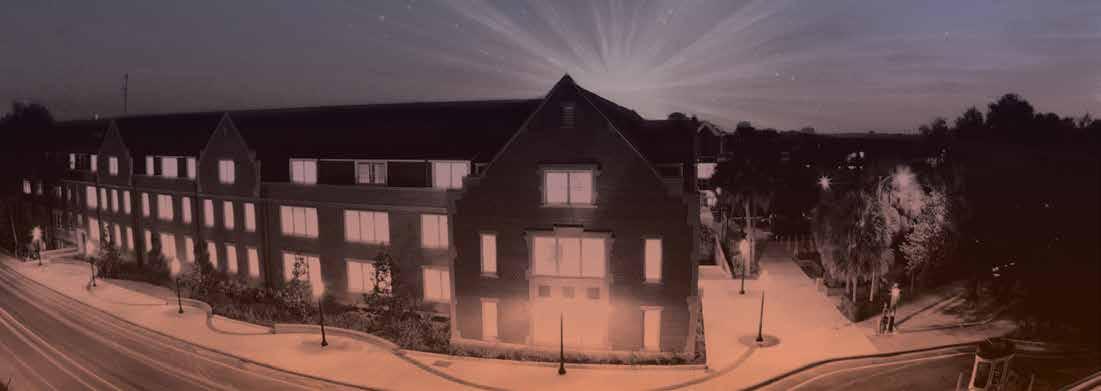
To conduct and foster impactful, cross-cutting, multimodal transportation research; educate the next generation of transportation leaders and facilitate technology transfer.
To lead the profession in shaping a better transportation future by functioning as a preeminent center of multidisciplinary transportation research, students’ top choice for transportation education, and a provider of state-of-the-art analysis and decision-support tools.
The Florida Department of Transportation (FDOT), the City of Gainesville (CoG) and the UFTI have partnered to create the Implementing Solutions from Transportation Research and Evaluating Emerging Technologies (I-STREET) Living Lab on the UF campus and surrounding highway network. The testbed is an area of designated roads and highways that deploys and evaluates numerous advanced technologies including connected and autonomous vehicles, smart devices and sensors. lt also develops and applies novel applications to enhance mobility and safety.

Contact:
Dr. Pruthvi Manjunatha
pruthvim@ufl.edu
istreet.ce.ufl.edu

Southeastern Transportation Research, Innovation, Development and Education Center
The STRIDE Center is the 2016 USDOT Region 4 (Southeast) University Transportation Center (UTC) housed at the University of Florida Transportation Institute (UFTI).
STRIDE’s mission is to develop novel strategies for Reducing Congestion. The Center has nine partners, representing seven states in the Southeastern U.S.
Contact: Ines Aviles-Spadoni, M.S. iaviles@ce.ufl.edu stride.ce.ufl.edu
The McTrans Center at the University of Florida develops, distributes and supports software programs for traffic engineering and transportation planning applications, including the Highway Capacity Software(HCS), TSIS-CORSIM and TRANSYT-7F. It also offers training courses and the highest level of technical support provided for these packages.
As an umbrella organization for many national and state-based programs, the T2 Center provides training, technical assistance, technology transfer services and safety information to transportation, public works and safety professionals, as well as the general public. Our mission is to transform engineering research and technology into common practice and to foster a safe, efficient, environmentally sound transportation system by improving skills and knowledge.
Contact:
Dr. Behzad Aghdashi
saghdashi@ufl.edu
mctrans.ce.ufl.edu
transportation.ufl.edu
Contact:
Dr. Nithin Agarwal
nithin.agarwal@ufl.edu
techtransfer.ce.ufl.edu


UFTI Transportation Equity Program Director, Dr. Mehri Mohebbi, along with a team of researchers, investigated how to increase diversity and promote inclusion in training, recruiting and workforce retention efforts of southeastern Departments of Transportation (DOTs). The STRIDE-funded project, Transportation Workforce Development for State DOTs to Address Equity, Diversity, and Inclusion (EDI), produced a framework that defines the 3 Ps of Equitable Transportation Workforce Development (ETWD) including: promoting employees’ engagement in diversity planning; prioritizing investments in areas lacking diversity; and providing non-monetary incentives and benefits.
Dr. Mohebbi notes that the transportation industry lacks diversity across a variety of jobs and levels and that it is important to build a diverse workforce that reflects communities’ demographics. A more diverse workforce ultimately “contributes to the business goals of transportation agencies and creates the foundation for long-term relationships with the communities those agencies serve.” While initially focused on DOTs, the framework can be used by other transportation agencies, professional organizations and the private sector. For more information go to: transportation.institute.ufl.edu/research/transportation-equity-2.
Research Team:
Dr. Mehri Mohebbi, University of Florida, Dr. Virginia Sisiopiku, University of Alabama at Birmingham, Dr. Dimitra Michalaka, The Citadel, Dr. Kweku Brown, The Citadel
Dr. Mehri Mohebbi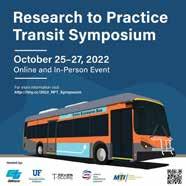
As the transit industry is poised to take advantage of the largest transit and rail investment in our lifetimes, the symposium, held October 25-27, 2022, was a platform where transit experts shared insights on how evidence-based research is being or can be, used to make the most of these opportunities in a changing environment.
Held virtually over three days with almost 800 participants, the central theme for the symposium was “Translating Transit Research into Practice.” In addition to discussions on transit research and practice in the US, a group of international speakers were invited to share transit insights from non-US contexts.
The Symposium focused on the following topics:
• Zero-fare transit
• Fare collection and payment options
• Electrification and zero emissions
• Transit resiliency
• Public health and transit
• Mobility hubs and multimodal coordination

• Strategic funding for public transit
• Managing costs and maintenance
The Symposium was convened by a partnership between the American Public Transportation Association (APTA), the California Department of Transportation (Caltrans), the University of Florida Transportation Institute and the T-SCORE University Transportation Center.
I-STREET brings together industry, municipalities and researchers to develop, test and market innovative mobility and safety solutions in realworld cities to create efficient, safe and user-friendly roads and transportation systems in cities around the world.
istreet.ce.ufl.edu
LET’S WORK TOGETHER!
“Not just a concept, it’s real life”

Goal: The operational and safety benefits of information-based strategies (messages to CAVs) are evaluated using a simulation framework. Specifically, the impacts of providing speed-control messages to connected vehicles on the travel times and near misses along the corridor are evaluated. A simulation framework that combines a traffic simulator with the surrogate safety assessment tool is used.
Sponsor: FDOT (in collaboration with Siemens)
Status: Active
Research Team: Dr. Siva Srinivasan (PI) and Co-PIs: Dr. Ilir Bejleri, Dr. Nithin Agarwal, Dr. Rui Guo

Goal: To learn older (50+) adults’ perspectives of autonomous vehicles (AV) and to identify user perspectives of automated ride sharing services and to solicit responses pertaining to adoption and acceptance practices. Older adults in four geographic areas can complete an AV ride sharing experience and participate in pre- and post- ride surveys and focus groups. We are partnered with beep, Inc. in Orlando, Florida. beep is recognized as a leader in AV ride sharing by both the United States Department of Transportation (US DOT) and the National Highway Traffic and Safety Administration (NHTSA). beep has successfully tested AV ride sharing solutions in communities across the U.S. and is currently testing in Florida under FDOT guidance.
Sponsor: FDOT and beep
Status: Active
Research Team: Dr. Sherrilene Classen (PI) and Co-PIs: Dr. Nichole Stetten,Dr. Sandra Winter, Dr. Feifei Xiao and Dr. Carla VandeWeerd
Goal: The overall goal of this project was to evaluate the efficacy of dedicated short-range communications (DSRC) in improving efficiency and safety within a network of signalized intersections. We collected, processed and analyzed data collected from the Gainesville Trapezium, a set of high-volume arterials surrounding the University of Florida in Gainesville, Florida. The Trapezium is instrumented with various sensing equipment, including high-resolution loop detectors, video cameras, DSRC roadside and vehicles with on-board units provided by BRANDMOTION. We interviewed drivers of vehicles with on-board units to learn about their experience with the system.
Sponsor: FDOT and BRANDMOTION

Status: Completed
Research Team: Dr. Pruthvi Manjunatha, Dr. Lily Elefteriadou (PI), Dr. Sanjay Ranka (Co-PI)
Goal: E-scooters hold great potential as a first/last mile connector to public transit, yet we know very little about whether people are using them for this purpose or what barriers exist that could improve this use. This project partnered with Spin, an e-scooter company, to investigate usage of scooters as a first/last mile connector with a combination of GPS data provided by Spin and a survey of their users.
Sponsor: Ford Motor Company
Status: Completed
Research Team: Dr. Xilei Zhao (PI), Dr. Xiang Yan (Co-PI), Dr. Andrew Broaddus (Ford PI)
What does it do? The methodology shows spatial and temporal variation in travel characteristics for low-income and carless populations in comparison to higher-income populations. Planners and transit agencies can use the methodology at the regional/local level to improve transit options for these households, particularly in suburban and rural areas.
What does it do? The methodology examines the influencing factors for older adults to adopt shared mobility services. Planners, transit agencies, and social service agencies can use this information to design solutions that better address the mobility needs and challenges of the aging population.
What does it do? The online questionnaire examines changes in the transportation travel behavior of different population cohorts which can provide important insights for regional transit authorities and professionals involved in policy-making and planning.
Research Team:
Dr. Abhinav Alakshendra, University of Florida
Dr. Ruth Steiner, University of Florida
Dr. Allie Thomas, University of North Carolina at Chapel Hill
Based on Scenarios’ Needs
What does it do? The four editors can be used for different purposes:
1. suspending specific transit routes; 2. decreasing the transit frequency of a route; 3. increasing the transit frequency of a route; and 4. changing the service span of a route. Public transit agencies can use the editors to match vulnerable populations with transit solutions that improve their accessibility to various destinations (work, groceries, education, social activities) and develop scenarios based on changes in routes.
Research Team:
Dr. Eleni Bardaka, North Carolina State University
Dr. Xia Jin, Florida International University
Dr. Noreen McDonald, University of North Carolina at Chapel Hill
Dr. Ruth Steiner, University of Florida
Dr. Jeffrey LaMondia, Auburn University
PROJECT F4 - PRODUCT:
Computational Near-Crash Warning System Using Only the Basic Safety Messages (BSMS) Generated by the Connected Vehicles (CVS)
What does it do? This product can improve traffic safety by giving near-crash warnings utilizing a data source that does not rely on the vehicle’s own sensors and will continue to work if the vehicle sensors malfunction. It can also be used as an additional collision warning tool on top of the existing ones, potentially decreasing the number of traffic accidents.
Research Team:
Dr. Shuang Z. Tu, Jackson State University
Dr. Robert Whalin, Jackson State University
Work Zones
What does it do? The improved VISSIM models provide more accurate modeling of traffic conditions in freeway work zones which can inform agencies on how best to reduce congestion when planning lane closures.
Research Team:
Dr. Rod Turochy, Auburn University
Dr. Virginia Sisiopiku, University of Alabama at Birmingham
Dr. Billy Williams, North Carolina State University
Dr. James Tsai, Georgia Institute of Technology
1) Hybrid Machine Learning and Fuzzy Logic Model for Signal Timing Selection Under Non-Recurrent Conditions
2) Multi-Objective Optimization Methods to Select Signal Timing Plans Under Congestion Conditions
What do they do? State and local transportation agencies can use the products to design and implement signal timing plans for activation during nonrecurrent conditions like arterial incidents, diversions due to freeway incidents, surges in demands, and weather events. This is expected to improve the mobility and reliability of transportation systems.
Research Team:
Dr. Mohammed Hadi, Florida International University
Dr. Virginia Sisiopiku, University of Alabama at Birmingham
1) Scan of Urban Freight Policies and Technologies
2) Qualitative Analysis of Online Driver Comments
What do they do?
The products increase awareness of the problems faced by delivery drivers navigating urban areas. Planners, businesses and last-mile shipping carriers can use this information to design effective interventions and policies to address these issues.
Research Team:
Dr. Noreen McDonald, University of North Carolina
Dr. Ruth Steiner, University of Florida
What does it do?
The newly developed capacity model addresses known deficiencies in the current Highway Capacity Manual (HCM) weaving segment analysis and generates relatively lower capacities than the current HCM. Agencies can use the model to improve the geometry of those sections and mitigate the effects of impending congestion and associated safety risks.
Research Team:
Dr. Nagui Rouphail, North Carolina State University
Dr. Lily Elefteriadou, University of Florida
Dr. Ishtiak Ahmed, North Carolina State University
In 2022, the T2 Center continued to expand its reach. In each of our theme areas – training, safety, and technical services - the productivity and quality of our services have been recognized with new opportunities, new clients, and new contracts. T2 is proud of this ongoing record of achievement, built on the almost 40 years during which T2 established its reputation for excellence in technology transfer.The T2 Center was honored to be recognized by the American Public Works Association, Florida Chapter, at its annual meeting in November. T2 was presented with a chapter certificate recognizing our 30 years of service and participation with APWA Florida.
T2 Training Program - The T2 Training Program drew 1,745 students from 39 states and Canada with 134 classes. T2 established training partnerships with several statewide programs as well as with LTAP centers in Alabama, Kentucky, and Tennessee. Out new courses in transportation equity align with the goals of the Bipartisan Infrastructure Law to enable practitioners to deliver a more equitable transportation future. All T2 training programs focus on improving safety and efficiency and expanding decision makers’ knowledge and awareness.
Safety Resource Centers - For over a decade, the T2 Center has operated the Safety Resource Centers for PedBike and Occupant Protection, two of the emphasis areas for the FDOT Safety Office. Last grant year, the resource centers distributed over 150,000 safety materials, 1,004 car seats and 33,243 bicycle helmets to community safety partners throughout Florida. The resource centers also supported Florida’s child passenger safety technicians and instructors, awarding over 270 scholarships to help certify new technicians and 20 stipends to instructors to teach these courses. Working closely with the Safety Office, T2 developed the Florida Traffic Safety Resource Center (FTSRC), a centralized online store for ordering and distributing FDOT print and digital safety materials and equipment for all 17 emphasis areas. Our goal is to help fulfill FDOT’s “Target Zero” goal of zero fatalities and injuries resulting from traffic crashes on Florida’s roadways.

Transportation Safety Center (TSC) - We have recently completed safety audits for Wakulla and Jefferson counties, the seventh and eighth Florida counties in this ongoing project to identify and mitigate high risk rural roadway locations. We are continuing to develop online training for Safe Routes to School as well as to develop a framework for SRTS’s future to bring this lifesaving program to more Florida communities. This work suffered a setback with the untimely loss of our coworker Lucy Barr, who had worked as an SRTS trainer for 15 years and was instrumental in creating the online training. Our work on SRTS continues in her honor. TSC has taken first steps toward bringing leading-edge safety technologies to Florida roadways: first, exploring the use of tele-operated and autonomous vehicles for roadway incident response and, second, potential application of FHWA’s CARMA in ISTREET. CARMA is a program aimed at accelerating the use of a wide range of advanced technologies in transportation.

Other Projects - An important aspect of technology transfer these days is training the next generation of transportation workers. To this end, T2 is planning to work through a STRIDE grant to host a summit for southeastern states on workforce development in summer 2023. We are also working with the Federal Transit Administration on a research-to-practice (R2P) project to improve transit service and safety.
To all of these of these ventures, we welcome our newest staff members, Shraddha Sagar and Isabela Picoli. Shradda is an engineer who will be working primarily with TSC, and Isabela will be working in T2 administration.
Sincerely,
Dr. Nithin Agarwal, Director Last grant year the T2 Center distributed over 33,000 bicycle helmets.
Last grant year the T2 Center distributed over 33,000 bicycle helmets.
This past fiscal year was a pivotal point for McTrans’ operation and business toward developing, disseminating and supporting traffic engineering software. The Transportation Research Board (TRB) published the 7th Edition of the Highway Capacity Manual (HCM). As such, McTrans released “Version 8” of Highway Capacity Software (HCS), titled HCS2022. The HCS2022 is the next generation of HCS that complies with the newly released HCM and is offered as “Software as a Service (SaaS).” With this move, McTrans joined the pioneer tier in the industry in moving away from the old perpetual model and enabling everyone to afford to access traffic analysis software.
Besides HCS, McTrans released a major update for TSIS-CORSIM software in the past year. The next generation of TSIS-CORSIM software integrates live Bing map (offered by Microsoft) to the CORSIM, the transparent backend initially developed by the Federal Highway Administration (FHWA). This creates a comprehensive suite of features to model traffic in a microscopic fashion comparable with other software options in the market. Similar to HCS, TSIS-CORSIM is offered as SaaS, making it an affordable option for transportation professionals.
For the first time, McTrans center formed an External Advisory Board (EAB) to seek external strategic advice. The board includes members from private consulting firms, academic institutions, and state and federal government former employees. Besides the EAB, McTrans started a business partnership with the Institute for Transportation Engineers (ITE) to offer training for Highway Capacity analyses, Highway Safety Analyses, and Transportation Equity. This collaboration enables 17+ thousand ITE members to access McTrans-offered courses at a discounted rate.
By entering into the post-COVID era in the past fiscal year, McTrans started attending professional conferences and offering a diverse set of presentations, as well as hosting booths in the exhibitions. This has created a dynamic interaction between the McTrans and current and prospective users. Those fruitful in-person marketing efforts have resulted in considerable new sales opportunities. McTrans will continue engaging with the industry and higher education to offer the latest in traffic analysis through software implementation.

As the final word, I would like to express my sincere gratitude to McTrans, UFTI, and UF employees, EAB members, business partners and UFTI leadership for helping McTrans to grow successfully in the past year. Without their passionate efforts, achieving those milestones would not have been possible. I am looking forward to another prosperous year to come.
Sincerely,
Dr. Bezhad Aghdashi, Director
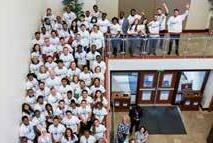

This past year, GatorITE, the student chapter of the Institute of Transportation (ITE) was busy promoting research, education, leadership and professional ethics among their student members once again. Under the watchful eye of Chapter Advisor, Dr. Fabio Sasahara, their diverse membership engaged in both technical and social events and though limited by COVID-19 restrictions, they managed to bring in speakers from as far as Brazil and Germany by utilizing virtual platforms.
An internal poll of undergraduate students, spearheaded by Chapter Treasurer, Bryce Grame, indicated that the top three interests of members included networking events; big data and analytics; and interview advising, so the Board of Directors developed the year’s activities based on that information.
Members successfullydefended their title for the seventh time at the 2022 ITE CollegiateTraffic Bowl for the Florida Puerto Rico District.
On campus, in October 2021, GatorITE members met with the UFTI’s External Advisory Board and in January 2022, ESSIE UF organized a Career Fair/Industrial Evening, which was attended by several GatorITE members. The easing of travel restrictions allowed for some travel in the fall and spring, which included:
• December 2021 - Six students traveled to Orlando to participate in the Florida Automated Vehicles Summit (FAV);
• January 2022 - 20 students attended the Transportation Research Board (TSB) conference in Washington, DC, where seven members presented research papers and posters.
• February 2022 - 10 members attended the Student Leadership Summit (SLS) held in Tallahassee, Florida and hosted by FAMU-FSU.
• July 2022 – Members traveled to Bonita Springs, Florida, and successfully defended their title for the seventh time at the 2022 ITE Collegiate Traffic Bowl for the Florida Puerto Rico District.
A total of 10 seminars and webinars were held between September 2021 and March 2022 with speakers from industry, government and UF. But it’s not all calculators and slide rules in this group; they also know how to enjoy life. The student chapter organized social meet ups as a way to get to know each other better and a barbecue at Lake Wauberg in the fall and a volleyball match on campus gave them a chance to have fun. But more outings are in the works.
Summer 2021
Stephen Spana, Ph.D. (CCE)
Kaitai Yang, M.S. (CCE)
Fall 2021
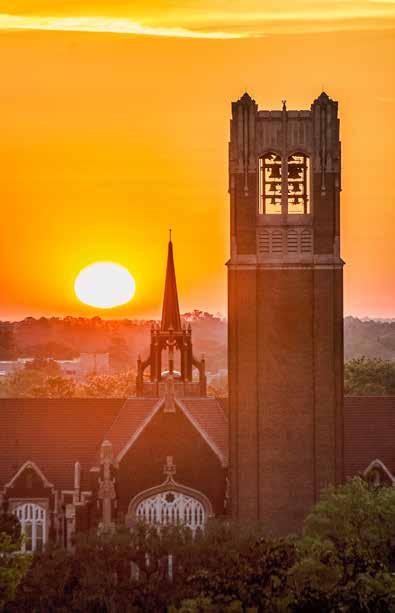
Alexander Foote, M.E. (CCE)
Vivek Gadhiya, M.S. (CCE)
Barkakati Leonie, M.S. (CCE)
Peng Wang, Ph.D. (CCE)
Xiaohan Wang, Ph.D.(CCE)
Juan E. Suarez, M.S. (CCE)
Spring 2022
Ehsan Amini, Ph.D. (CCE)
Tonghui Li, M.S. (CCE)
Lin Su, M.S. (CCE)
Summer 2022
Siddartha Gulhare, Ph.D. (CCE)
Sagar Patni, Ph.D. (CCE)

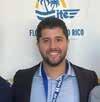
Department
Department of Civil & Coastal Engineering
Department
Department of Computer & Information Science & Engineering
Department of Civil & Coastal Engineering








Department of Urban & Regional Planning








 Dr. Sanjay Ranka Professor
of Computer & Information Science & Engineering
Dr. Lili Du Associate Professor
of Civil & Coastal Engineering
Ines, Aviles-Spadoni, M.S. Coordinator of Research Programs, STRIDE Center
Ada Lang Communications Specialist
Jennifer Gomez Administrative Assistant
Ondine Wells, M.S. Education & Technology Transfer Coordinator STRIDE Center
Dr. Lily Elefteriadou Director, UFTI & STRIDE Barbara Goldsby Professor, Department of Civil & Coastal Engineering
Dr. Behzad Aghdashi Director McTrans
Dr. Mehri Mohebbi Transportation Equity Program Director
Dr. Nithin Agarwal Director UFTI-T2 Center
Dr. Pruthvi Manjunatha I-Street “Living Lab” Manager And Research Assistant Professor, Department of Civil & Coastal Engineering
Dr. Jennifer Bridges Associate Professor
Dr. Ruth Steiner Professor
Dr. Yu Wang Autonomous And Connected Vehicle Group Lead
Dr. Xiang ‘Jacob’ Yan Assistant Professor of Civil Engineering
Gustavo Zschaber Ph.D. Student (Transportation Student Body Representative To ISC)
Dona Moss Grants Administrator, Department of Civil & Coastal Engineering
Dr. Eakta Jain Associate Professor
Dr. Siva Srinivasan Associate Professor
Dr. Sanjay Ranka Professor
of Computer & Information Science & Engineering
Dr. Lili Du Associate Professor
of Civil & Coastal Engineering
Ines, Aviles-Spadoni, M.S. Coordinator of Research Programs, STRIDE Center
Ada Lang Communications Specialist
Jennifer Gomez Administrative Assistant
Ondine Wells, M.S. Education & Technology Transfer Coordinator STRIDE Center
Dr. Lily Elefteriadou Director, UFTI & STRIDE Barbara Goldsby Professor, Department of Civil & Coastal Engineering
Dr. Behzad Aghdashi Director McTrans
Dr. Mehri Mohebbi Transportation Equity Program Director
Dr. Nithin Agarwal Director UFTI-T2 Center
Dr. Pruthvi Manjunatha I-Street “Living Lab” Manager And Research Assistant Professor, Department of Civil & Coastal Engineering
Dr. Jennifer Bridges Associate Professor
Dr. Ruth Steiner Professor
Dr. Yu Wang Autonomous And Connected Vehicle Group Lead
Dr. Xiang ‘Jacob’ Yan Assistant Professor of Civil Engineering
Gustavo Zschaber Ph.D. Student (Transportation Student Body Representative To ISC)
Dona Moss Grants Administrator, Department of Civil & Coastal Engineering
Dr. Eakta Jain Associate Professor
Dr. Siva Srinivasan Associate Professor















Adibfar, A., Gulhare, S., Srinivasan, S., Costin, A. (2022). Analysis and Modeling of Changes in Online Shopping Behavior due to Covid-19 Pandemic: A Florida Case Study, Transport Policy, Volume 126, pp 162-176, DOI: 10.1016/j.tranpol.2022.07.003.
Agarwal, N., Srinivasan, S., Rodrigues-Silva, K., Hallaren, R.A. (2021). Lawrence Street Traffic Calming Study, Project UF–Hernando County Contract 21-PS0063 Final Report, submitted to Hernando County, Florida. (40 pages)
Al-Kaisy, A., Jafari, A., Washburn, S. (2021). Investigation of Operational Performance on 2+1 Highways. Advances in Transportation Studies. Volume LIV, pp. 17-32. http://www. atsinternationaljournal.com/index.php/2021-issues/liv-july-2021/1203-investigation-ofoperational-performance-on-2-1-highways.
Amini, E., Xu, D., Rouphail, N., Elefteriadou, L., Aghdashi, B. (2021). Capacity Analysis Framework for Freeway Ramp Weaves, ASCE Journal of Transportation Engineering, Part A: Systems, Volume 147, Issue 12. https://doi.org/10.1061/JTEPBS.0000594
Banerjee, T., Chen, K., Almarez, A., Sengupta, R., Karnati, Y., Grame, B., Posadas, P., Poddar, P., Schenck, Dolmore, J., Srinivasan, S., Rangrajan, A., Ranka, S. (2022). A Modern Intersection Data Analytics System for Pedestrian and Vehicular Safety”, accepted for the IEEE 25th International Conference on Intelligent Transportation Systems (ITSC), Macau, China, October 8-12, 2022. (6 pages)
Bejleri, I., Xu, X., Brown, D., Srinivasan, S., Agarwal, N. (2021). Automatic Horizontal Curve Identification for Large Areas from Geographic Information System Roadway Centerlines, Transportation Research Record: Journal of the Transportation Research Board. https://doi. org/10.1177/03611981211032220.
Carrick, G., Srinivasan, S. (2022). Characterizing Incident Responder Crashes Involving Move Over Law Violations, Transportation Research Record: Journal of the Transportation Research Board. (Published online 12 pages), DOI: 10.1177/03611981221108385.
Chakraborty, P., Parker, R., Hoque, T., Du, L., Wang, S., Bhunia, S. (2022). Addressing the Range Anxiety of Battery Electric Vehicles with Charging En Route, Scientific Reports 12 (1), pp. 1-15
Charisis, A., Spana, S., Kaiser, E., Du, L. (2021). Locating and Scheduling Inner-City Hubs for Last-Mile Deliveries, International Journal for Traffic and Transportation Engineering, 10(2), pp. 169-186.
Chen, S., Yan, X., Pan, H., Deal, B. (2021). Using Big Data for Last-Mile Performance Evaluation:An Accessibility-Based Approach. Travel Behaviour and Society, 25, 153-163. https://doi.org/10.1016/j.tbs.2021.06.003.
Chen, R., Tran, K.T. (2021). 2D Gauss-Newton Full Waveform Inversion of SH- and LoveWaves in the Time-Domain” Journal of Applied Geophysics, 104636, pp.10, https://doi. org/10.1016/j.jappgeo.2021.104363.
Classen, S., Hwangbo, S. W., Mason, J., Wersal, J., Rogers, J., Sisiopiku, V. P. (2021). Older Drivers’ Motion and Simulator Sickness Before and After Automated Vehicle Exposure. Safety, 7(2), 26. https://doi.org/10.3390/safety7020026.
Dinh, K., Gucunski, N., Tran, K.T., Novod, A., Nguyen, T. (2021). Full-Resolution 3D Imaging for Concrete Structures with Dual-Polarization GPR, Automation in Construction, Vol. 125, 103652, pp.11, https://doi.org/10.1016/j.autcon.2021.103652.
Elefteriadou, L., Classen, S., Manjunatha, P., Srinivasan, S., Steiner, R., Bejleri, I., Mohebbi, M., Yan, X., Patni, S., Kibet, L., Jeghers, M. (2022). Transportation Mobility Assessment and Recommendations for Smart City Planning, Project BDV31-977-115. Final Report Submitted to the Florida Department of Transportation. (81 pages)
Emami, P., Elefteriadou, L., Ranka, S. (2022). Long-Range Multi-Object Tracking at Traffic Intersections on Low-Power Devices, in IEEE Transactions on Intelligent Transportation Systems, vol. 23, no. 3, pp. 2482-2493, March 2022, doi: 10.1109/TITS.2021.3115513.
Gao, S., Wang, Y. (2022). Explainable Deep Learning Powered Building Risk Assessment Model for Proactive Hurricane Response. Risk Analysis. pp.1-13, doi: 10.1111/risa.13990.
Gulhare, S., Srinivasan, S. (2021). A Probabilistic Method to Estimate Emissions and Fuel Consumption using Connected Vehicle Data from a Mixed Fleet, 2021 IEEE International Intelligent Transportation Systems Conference (ITSC), Indianapolis, September 19-22, 2021, pp. 3833-3838, DOI:10.1109/ITSC48978.2021.9564729.
Hao, H., Wang, Y. (2022). Disentangling Relations Between Urban Form and Urban Accessibility for Resilience to Extreme Weather and Climate Events. Landscape and Urban Planning. 220. 104352. doi: 10.1016/j.landurbplan.2022.104352.
Krasniuk, S., Classen, S., Morrow, S. A. (2021). Clinical Determinants of Fitness to Drive in Drivers with Multiple Sclerosis: A Systematic Review. Paper for the Canadian Association of Road Safety Professionals/ La Prévention Routière Internationale, 2021 Joint Virtual Conference, August 22-25, 2021.
Kuligowski, E., Zhao, X., Lovreglio, R., Xu, N., Yang, K., Westbury, A., Nilsson, D., Brown, N. (2022). Modeling evacuation decisions in the 2019 Kincade fire in California. Safety Science, 146, 105541.
Liu, X., Van Hentenryck, P., Zhao, X. (2021). Optimization models for estimating transit network origin-destination flows with big transit data. Journal of Big Data Analytics in Transportation, 1-16.
Mason, J., Classen, S., Wersal, J., Sisiopiku, V. (2021). Construct Validity and Test–Retest Reliability of the Automated Vehicle User Perception Survey. Frontiers in Psychology, 12, 626791. https://doi.org/10.3389/fpsyg.2021.626791.
Manjunatha, P., Roy, S., Elefteriadou, Guin, A., Hunter, M. (2022). Evaluation of the Operational Effects of Autonomous and Connected Vehicles through Microsimulation, Journal of the Transportation Research Record, https://doi.org/10.1177/03611981211068460.
Mirzanejad M., Tran K.T., McVay M., Horhota D., Wasman S. (2021). Deep Void Detection with 3D Full Waveform Inversion of Surface-Based and In-Depth Source Seismic Wavefields, Engineering Geology, Vol. 294, 106407, pp. 13, https://doi.org/10.1016/j. enggeo.2021.106407.
Mu, C., Du, L, Zhao. X. (2021). Event Triggered Rolling Horizon Based Systematical Trajectory Planning for Merging Platoons at Mainline-Ramp Intersection. Transportation Research Part C: Emerging Technologies, 125:103006, DOI:10.1016/j.trc.2021.103006, pp. 1-30.
Peng, W., Du. L. (2022). Investigating optimal carpool scheme by a semi-centralized ridematching approach. IEEE Transactions on ITS. DOI: 10.1109/TITS.2021.3135648, pp. 1-15
Piva, F.J., Setti, J.R., Washburn, S.S. (2022). Using Traffic Simulation for Level of Service Traveler Perception Studies. Vol 34 No 2, Promet Traffic & Transportation. doi.org/10.7307/ ptt.v34i2.3965
Qiu,J., Jing,Y., Peng, W., Du, L., Hu, Y. (2022). Identifying critical transfer zones to coordinate transit with on-demand services using crowdsourced trajectory data. Journal of Intelligent Transportation Systems Technology, Planning, and Operations, pp. 1-27. doi.org/10.10 80/15472450.2022.2132389
Shen, J., Kammara, E.H., Du, L. (2022). Nonconvex, Fully Distributed Optimization Based CAV Platooning Control under Nonlinear Vehicle Dynamics, IEEE Transactions on ITS.DOI: 10.1109/TITS.2022.3175668, pp. 1-16.
Spana, S., Du, L. (2022). Optimal Information Perturbation for Traffic Congestion Mitigation: Gaussian Process Regression and Optimization. Transportation Research Part C: Emerging Technologies 138: 103647. DOI: 10.1016/j.trc.2022.103647, pp. 1-24.
Srinivasan, S., Bejleri, I., Gulhare, S., Lee, I. (2021). Road Ranger Programs for Arterials, Project BDV31 TWO 977-142 Final Report, Submitted to the Florida Department of Transportation. (57 pages)
Steiner, R. L., Bai, X., Bejleri, I., Han, M., Yan, X. (2021). Partnerships between Agencies and Transportation Network Companies for Transportation-Disadvantage Populations: Benefits, Problems, and Challenges. Transportation Research Record. doi.org/10.1177/03611981211032629VV
Agarwal, N. Local Roads Safety Program in Florida, Conference: ASCE ICTD 2022 Seattle, May-June 2022.
Bejleri, I., Noh, S., Chen, C., Zhai, L. A Geographic Information System Toolkit for Modeling Transit Accessibility to Services. Poster Presentation in Transportation Research Board 101st Annual Meeting, January 2022.
Chen, C., Bejleri, I., Zhai, L., Noh, S. A Geospatial Toolkit for Modeling Public Transit Accessibility to Community Essential Services. Poster Presentation in in Association of Collegiate Schools of Planning (ACSP), October 2021, (virtual).
Classen, S., Mason, J., Yang, W., Sisiopiku, V.P. Experience of Drivers of All Age Groups in Accepting Autonomous Vehicle Technology. University Transportation Centers Annual Conference, Boca Raton, Florida, March 2022.
Elefteriadou, L. Successful Course Delivery During the Pandemic, CUTC Summer Meeting, Big Sky, MT, June 2022.
Fang, J., Yan, X., Bejleri, I. Which Trip Destination Matters? Estimating the Influence of Land Use on Mode Choice for Home-Based Complex Tours. Poster Presentation in Transportation Research Board 101st Annual Meeting, January 2022.
Gao, S., Wang, Y., Wang, Q. Household-Targeted Hurricane Warnings for Effective Evacuation: Case Study of Hurricane Irma in North Miami Beach. 2022 ASCE’s Construction Institute and Construction Research Council. 1116–1124. Arlington, VA; March 2022.
Giang, W.C.W., Mason, J., Zheng, H., Rudd, N., Classen, S. Development and Effects of ACC Roles and Responsibilities Training for Younger and Older Adults. Transportation Research Board Annual Meeting – Standing Committee on Vehicle User Education, Training and Licensing: ACH60. Transportation Research Board’s 101st Annual Conference, Washington DC, January 2022.
Gulhare, S., Srinivasan, S. A Probabilistic Method to Estimate Emissions and Fuel Consumption using Connected Vehicle Data from a Mixed Fleet”, presented at the IEEE International Intelligent Transportation Systems Conference (ITSC) Indianapolis, September 2021.
Hao, H., Wang, Y. Smart Curb Digital Twin: Inventorying Curb Environments using Computer Vision and Street Imagery. 2nd Annual International Conference on Digital Twins and Parallel Intelligence (IEEE DTPI 2022). Smart City Digital Twins Convergence (by invitation only) Boston, U.S., Accepted, 2022.
Hwangbo, S. W., Classen, S., Mason, J., Wersal, J., Rogers, J., Sisiopiku, V. Older Adults’ Motion Sickness and Simulator Sickness after Riding in an On-Road Automated Shuttle and Simulated Drive in Autonomous Mode. Florida Occupational Therapy Association Virtual Conference. November 2021.
Hwangbo, S. W., Mason, J., Classen, S. Predictors of Simulator Sickness in a Driving Simulator in Autonomous Mode. Occupational Therapy Summit of Scholars, Madison, WI, June 2022.
Knott, M., Classen, S., Leung, V., Alvarez, L. The Car Drives Itself Home: Exploring Healthcare Shift-Workers’ Sleepy-Driving Experiences. Oral paper presentation. Canadian Association of Occupational Therapy Conference, Whistler, BC., May 2022.
Li, Y., Classen, S., Giang, W.C., Winter, S.M., Ramirez-Zamora, A. Protocol: Driving Performance of People with Parkinson’s disease (PD) Using Autonomous In-Vehicle Technologies, Video presentation, PHHP Research Day 2022, University of Florida, Gainesville, FL, Mason, J., Classen, S. Automated Shuttles and Buses for All Users (Session B210): Older Drivers and Persons with Disabilities Experiences with Automated Shuttles. Virtually presented at the TRB: Automated Road Transportation Symposium (ARTS), Washington DC, July 2021.
Manjunatha, P., Mason, J., Classen, S., Elefteriadou, L., Srinivasan, S., Huang, E. Public Perception and Lessons Learned from Autonomous Shuttle Demonstration Studies. Transportation Research Board’s 101st Annual Conference, Washington DC, January 2022.
Mirzanejad M., Tran K.T., McVay M., Horhota D., Wasman S. Deep Void Detection with 3D Seismic Waveform Tomography, 5 pages, the Sixth International Conference on Engineering Geophysics (ICEG), virtual, October 2021.
Noh, S., Bejleri, I., Lee, I. Identifying Spatial Gaps in Alternative Transportation Services For Low-Income Older Adults By Age Group. Presentation in in Association of Collegiate Schools of Planning (ACSP), virtual, October 2021.
Silva, K. C. R., Srinivasan, S., Ferraz, A. C. P. Transferability of North American Crash Prediction Models for Two Lane Highways to South American Context, presented at the PANAM Conference, Virtual, August 2021.
Sisiopiku, V.P., Yang, W., Mason, J., McKinney, B., Hwangbo, S. W., Classen, S. Users’ Perceptions and Attitudes toward Autonomous Vehicle Technologies after Simulation Exposure – A Study across the Lifespan. Proceedings of the 2022 Road Safety and Simulation International Conference, Athens, Greece, June 2022.
Srinivasan, S. Enhancing Multi-Modal Transportation Safety Through Technology, Keynote address at the Conference on Smart and Sustainable Development of Urban Green Infrastructure in India and Canada, organized by National Institute of Technology (NIT), Tiruchirappalli, India with the support of Shastri Indo-Canadian Institute (SICI), virtual, March 2022.
Su, L., Yan, X., Zhao, X. Micromobility Equity: A Comparison of Shared E-Scooters and Station-based Bikeshare in Washington DC. Proceedings of Transportation Research Board 101st Annual Meeting, January 2022.
Wandenkolk, I., Classen, S., Mason, J., Yarney, A., Winter, S. Interim Analysis to Quantify the Effect of an OT Driving Intervention on Real-World Driving Events in Combat Veterans. Occupational Therapy Summit of Scholars, Madison, WI, June 2022.
Wang Y., Tran K.T., Horhota D. Road Sinkhole Imaging with Ambient Noise Tomography, ASCE Geotechnical Special Publication, GSP 334, pp. 41-51, Geo-congress 2022, Charlotte, North Carolina, March 2022.
Washburn, S. Highway Capacity Manual Upgrade: What Is New for the 7th Edition? Presenter for topic New Two-Lane Highway Analysis Method, webinar, Western Section of the Institute of Transportation Engineers (ITE), April 2022.
Wei, J., Giang, W.C.W., Jeghers, M., Rogers, J., Li, Y., Ramirez-Zamora, A., Winter, S.M., Classen, S. Feasibility Study to Assess Procedure and Outcomes for Drivers using Autonomous In-Vehicle Technologies. 9th Annual Occupational Therapy Summit of Scholars, 2021. Colorado State University, Fort Collins, CO. June 2021.
Xu, X., Bejleri, I. (2022, January). Spatio-Temporal Patterns of Traffic Fatalities and Economic Development: A Study of U.S. Counties. Poster Presentation in Transportation Research Board 101st Annual Meeting
Zhai, L., Bejleri, I. Predicting Future Reduction of Traffic Crashes Due to Adoption Of Fully Autonomous Vehicles. Presentation in in Association of Collegiate Schools of Planning (ACSP), virtual, October 2021.
Zhang, X., Zhou, Z., Yan, X., Zhao, X. Examining Spatial Heterogeneity in the Determinants of Ridesourcing Trips with Explainable Machine Learning. Proceedings of Transportation Research Board 101st Annual Meeting, January 2022.
Zhao, X., Xu, Y., Lovreglio, R., Kuligowski, E., Nilsson, D., Cova, T., Wu, A., Yan, X. Estimating Wildfire Evacuation Decision and Departure Timing Using Massive GPS Data. Proceedings of Transportation Research Board 101st Annual Meeting, January 2022.
